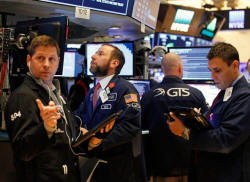Column: Why U.S. stock market dive points to good news
for retirees
 Send a link to a friend
Send a link to a friend
 [February 07, 2018]
By Mark Miller [February 07, 2018]
By Mark Miller
CHICAGO (Reuters) - (The opinions expressed
here are those of the author, a columnist for Reuters)
Whenever the U.S. stock market nosedives, retirement portfolios seem to
get all the attention.
And no doubt about it: the sharp market pullback that began two weeks
ago is causing headaches for anyone on the verge of retirement. The big
concern is so-called sequence of return risk - that is, the risk that a
sharp downturn near the start of retirement will lead to a long-term
shortfall in resources available for spending.
But put this in the category of “a good problem to have.” Just over half
(52 percent) of U.S. households own retirement accounts and a similar
number hold stocks directly or indirectly, according to Federal Reserve
data.

And if you are part of that lucky half, your portfolio still is much
larger than a year ago - the S&P 500 on Tuesday closed 17.6 percent
higher than it did exactly a year earlier and an astonishing 34 percent
higher than at the start of 2016.
Moreover, the very economic trends that seem to be worrying Wall Street
actually will be good news for many older Americans.
SIDELINED WORKERS OFF THE BENCH
The headline that really put the market in a tailspin was the U.S.
government report last Friday on the strength of the labor market. The
January jobless rate held steady at 4.1 percent, but payrolls rose by
200,000 and average hourly earnings rose 0.3 percent, following a gain
of 0.4 percent in December. (http://reut.rs/2DWz25c)
And for workers over age 55, the “headline” unemployment number last
month was just 3 percent. But that figure is much higher when you
include older workers who would like a job but gave up looking more than
12 months ago - 8.7 percent, according to analysis of the government
figures by the Schwartz Center for Economic Policy Analysis (SCEPA) at
the New School.
Late-career employment plays a critical role in determining your
retirement security. These typically are the highest-earning years, and
they can be important for building savings or earning credits toward
higher Social Security or pension payments. And the Great Recession, and
the ensuing decade of weak demand for labor, has had a crippling effect
on the retirement prospects for millions of Americans.
But a deeper dive by SCEPA into recent jobs data points to something
encouraging: the labor market may be getting tight enough to pull
long-sidelined older workers back into the job market.
SCEPA reports that 797,000 people ages 55 and older found a job in
December, the most recent period for which data is available. Fifty-five
percent of them (439,000) came from outside the labor force - in other
words, they had not been hunting for work in previous months. The
percentage was considerably higher than it has been over the past five
years, when it generally hovered around 35 to 40 percent. Another 93,000
who were outside the labor force started looking for work, and are now
counted as unemployed. So a total of 532,000 people came "off the
bench.”
[to top of second column] |

Traders work on the floor of the New York Stock Exchange in New
York, U.S., February 6, 2018. REUTERS/Brendan Mcdermid

“These are fairly high numbers,” said Teresa Ghilarducci, a labor
economist and SCEPA’s director. “When people who have been out of work
for a long time and become discouraged see a tighter labor market, that
can inspire them to come back.”
Not that everything is rosy here. Another 422,000 older workers dropped
out of the labor force because they lost jobs and either did not try to
replace them or gave up on their job searches. Some may have simply
retired.
HIGHER INTEREST RATES, INFLATION
The strengthening labor market and tentative signs of wage growth have
spooked the stock market because they point toward possible higher
inflation. That, in turn, could prompt the Federal Reserve to accelerate
its moves to lift interest rates - shifting investment momentum away
from stocks and toward bonds.
But this would be good news for retirees, who have suffered through a
full decade of Fed monetary policy that has kept interest rates near
zero. Many retirees rely on low-risk bonds and other interest-bearing
instruments for yield on their savings.
Higher inflation also would help retirees. Social Security’s annual
cost-of-living adjustment (COLA) is geared to the Consumer Price Index,
and in recent years it has failed to keep up with fast-rising healthcare
costs. For many seniors, this year’s 2 percent COLA was consumed
entirely by higher Medicare Part B premiums.

Most economists expect inflation to hold steady this year at around 2
percent, and the Medicare trustees forecast that the Part B premium will
hold steady in 2019 at $134. That would give Social Security enrollees a
real raise in 2019, and it could go higher if inflation jumps beyond the
consensus figure.
So yes - the market drop will hurt retirement portfolios - at least in
the short term. But it appears that what is bad for Wall Street could be
good for Main Street - at least the people there who are retired or
getting close to it.
(Editing by Matthew Lewis)
[© 2018 Thomson Reuters. All rights
reserved.] Copyright 2018 Reuters. All rights reserved. This material may not be published,
broadcast, rewritten or redistributed.
Thompson Reuters is solely responsible for this content.
 |